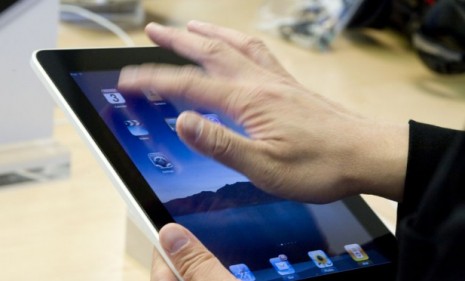Will the iPhone replace credit cards?
After transforming the way we listen to music and use our cell phones, Apple is rumored to have a new revolution planned: Changing the way we pay for everyday goods and services.

A free daily email with the biggest news stories of the day – and the best features from TheWeek.com
You are now subscribed
Your newsletter sign-up was successful
The tech world is abuzz this week with news that Apple could soon revolutionize the way we pay for purchases at the supermarket or corner store. The company is reportedly planning on adding so-called near-field communication (NFC) technology to its next generation of iPhones and iPads, allowing users to make purchases with the mobile devices. Here, a brief instant guide:
What is near-field communication?
NFC is a technology that allows devices to wirelessly send or "beam" and receive information at a distance of 4 inches or less. It is "big in Japan" (naturally) where people use NFC-enabled phones to buy train tickets or pay for purchases by simply swiping their phone in front of a payment terminal. But there could be far more uses of NFC. For instance, a movie poster could have a "tag" embedded in it, such that when you swiped your phone over it, the movie's trailer would automatically download to your phone. It's not "really new... or cutting edge," says Bryan Gardiner at Gizmodo, but it's yet to be as widely adopted in the U.S. as it has been in Japan and Europe.
The Week
Escape your echo chamber. Get the facts behind the news, plus analysis from multiple perspectives.

Sign up for The Week's Free Newsletters
From our morning news briefing to a weekly Good News Newsletter, get the best of The Week delivered directly to your inbox.
From our morning news briefing to a weekly Good News Newsletter, get the best of The Week delivered directly to your inbox.
Is Apple definitely adding NFC to iPhones and iPads?
No, but it is widely rumored. Richard Doherty, director of consulting firm Envisioneering Group, tells Bloomberg that Apple has plans to add the technology to the next generation of iPhone and iPad. Doherty also says Apple has created a prototype of payment terminals for small businesses and chain retailers that would allow users to pay with their iPads and iPhones, and is even considering subsidizing the terminals to encourage their wide use (and more iPad and iPhone sales).
Is Doherty believable?
At Mobile Industry Review, Ewan says we can assume Doherty is authorized by Apple to spout such things, or he "would already have been silenced by a dozen lawsuits." The rumors were further validated when tech blogs spotted an Apple job listing for an engineer experienced with NFC technology and two "global mobile payment platform managers." Additionally, Apple made a "significant hire related to mobile payments last year." While all of these facts might mean little on their own, "taken together, they stand as a fairly solid indicator that Apple is at least seriously exploring NFC's possibilities," says Darrell Etherington at GigaOM.
A free daily email with the biggest news stories of the day – and the best features from TheWeek.com
Do other smartphones have NFC?
Yes, the Samsung Nexus S phone, which runs on Android, can read NFC tags; Nokia has also pushed the technology for years, but users have been slow to adopt. And though it uses a different technology, Starbucks just expanded a program that lets iPhone, iPad, and some BlackBerry users pay by using an app on their device.
So what's special about these rumored Apple devices?
"Apple could be the game-changer," Doherty says. As it did with digital music, for example, Apple could take over the realm of mobile payments and spread the technology quickly. "Once Apple integrates NFC into their devices, it will be game over for every other provider in the marketplace," says Ewan at Mobile Industry Review. "Apple NFC — if actually launched — will become the standard in America overnight." It could also pose a threat to credit card companies like Visa and MasterCard.
How would these iPhone payments work?
With NFC, Apple would draw money directly from your bank account to pay for purchases, similar to PayPal. It could cut out credit card companies and the hefty surcharges they impose in favor of its own "iCash." Apple would get a piece of the $6.2 trillion Americans spend yearly on goods and services, and, by cutting out credit card fees incurred when people buy music or videos on iTunes, rake in even more money. It will be game over for credit card companies, say Ewan, and "it’s going to be interesting, very interesting indeed."
Sources: Gizmodo, Bloomberg, GigaOM, Mobile Industry Review, Newsweek
-
 How the FCC’s ‘equal time’ rule works
How the FCC’s ‘equal time’ rule worksIn the Spotlight The law is at the heart of the Colbert-CBS conflict
-
 What is the endgame in the DHS shutdown?
What is the endgame in the DHS shutdown?Today’s Big Question Democrats want to rein in ICE’s immigration crackdown
-
 ‘Poor time management isn’t just an inconvenience’
‘Poor time management isn’t just an inconvenience’Instant Opinion Opinion, comment and editorials of the day